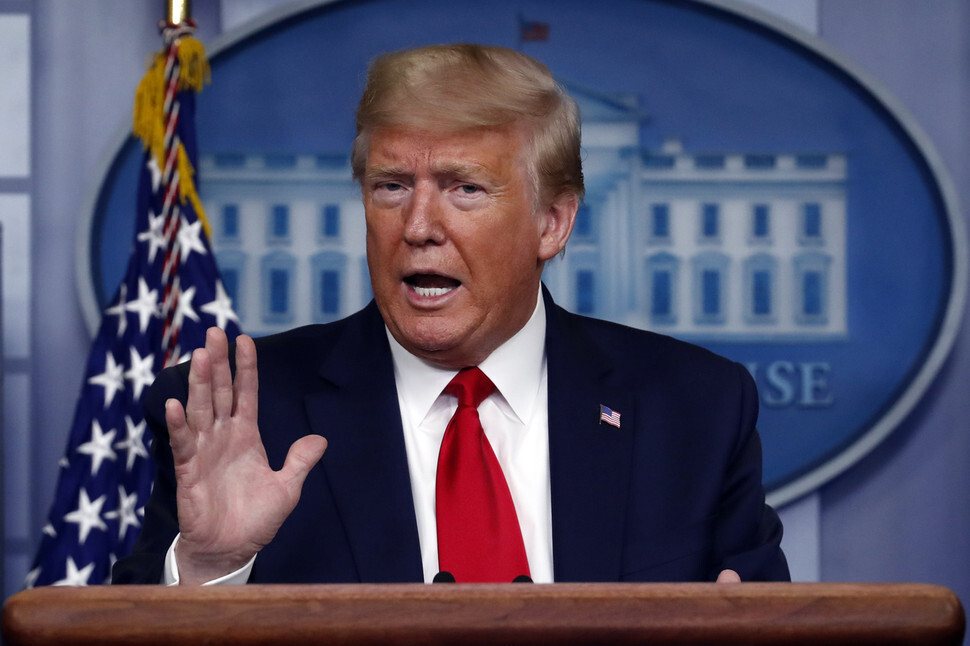hankyoreh
Links to other country sites 다른 나라 사이트 링크
Trump rejected S. Korea’s offer to increase defense cost by 13%, US press reports

According to a report in the foreign press, the South Korean government offered a 13% year-on-year increase of its financial contribution to the cost of stationing American troops in the country in its ongoing negotiations with the US, but that offer was rejected by US President Donald Trump. The negotiations have been disrupted by the “Trump factor” at the very moment when it looked as if a tentative agreement had been reached, leading some to predict that the deadlock in the talks will continue.
In an Apr. 11 report, Reuters quoted two US government officials as saying that Trump had turned down an offer that the South Korean government made in advance of the parliamentary elections, on Apr. 15, to raise its contribution by 13% from the previous year. Trump decided to reject the deal, the wire service said, following consultations with Defense Secretary Mark Esper and Secretary of State Mike Pompeo.
In connection with this, American broadcaster NBC reported that Pompeo and Esper had visited the White House on Mar. 31 in an attempt to prevent South Korean employees of US Forces Korea (USFK) from being put on unpaid leave. This constitutes considerable evidence for the view that Trump’s uncompromising demand for a major increase in funding is responsible for the lack of progress in the two countries’ defense cost-sharing negotiations.
Negotiations may remain deadlocked up to US presidential electionThe negotiations are at a serious impasse: after failing to reach an agreement during a seventh round of talks, which began on Mar. 17 and lasted for three days, the two teams of negotiators haven’t even scheduled the next round. On Apr. 6, Esper had a phone call with his South Korean counterpart, Minister of National Defense Jeong Kyeong-doo, in an attempt to advance the negotiations. But when Jeong asked for the furlough of USFK’s South Korean employees to be dealt with first, Esper reportedly reemphasized the need for South Korea to shoulder a much bigger share of the defense cost.
Given these circumstances, the American press has raised the possibility that the negotiations might remain deadlocked for a long time. Reuters quoted an US government official as saying that there’s virtually no chance of a deal being reached before South Korea’s parliamentary elections. “The official said there was concern that this could go well into summer and come closer to November’s US presidential election, perhaps making Trump less amenable to lowering his demands,” Reuters said. The wire service also cited experts’ concerns that a prolonged stalemate in the negotiations could damage the South Korea-US alliance.
By Park Byong-su, senior staff writer, and Hwang Joon-bum, Washington correspondent
Please direct comments or questions to [english@hani.co.kr]

Editorial・opinion
![[Column] Season 2 of special prosecutor probe may be coming to Korea soon [Column] Season 2 of special prosecutor probe may be coming to Korea soon](https://flexible.img.hani.co.kr/flexible/normal/500/300/imgdb/original/2024/0426/3317141030699447.jpg) [Column] Season 2 of special prosecutor probe may be coming to Korea soon
[Column] Season 2 of special prosecutor probe may be coming to Korea soon![[Column] Park Geun-hye déjà vu in Yoon Suk-yeol [Column] Park Geun-hye déjà vu in Yoon Suk-yeol](https://flexible.img.hani.co.kr/flexible/normal/500/300/imgdb/original/2024/0424/651713945113788.jpg) [Column] Park Geun-hye déjà vu in Yoon Suk-yeol
[Column] Park Geun-hye déjà vu in Yoon Suk-yeol- [Editorial] New weight of N. Korea’s nuclear threats makes dialogue all the more urgent
- [Guest essay] The real reason Korea’s new right wants to dub Rhee a founding father
- [Column] ‘Choson’: Is it time we start referring to N. Korea in its own terms?
- [Editorial] Japan’s rewriting of history with Korea has gone too far
- [Column] The president’s questionable capacity for dialogue
- [Column] Are chaebol firms just pizza pies for families to divvy up as they please?
- [Column] Has Korea, too, crossed the Rubicon on China?
- [Correspondent’s column] In Japan’s alliance with US, echoes of its past alliances with UK
Most viewed articles
- 1After election rout, Yoon’s left with 3 choices for dealing with the opposition
- 2Two factors that’ll decide if Korea’s economy keeps on its upward trend
- 3Noting shared ‘values,’ Korea hints at passport-free travel with Japan
- 4AI is catching up with humans at a ‘shocking’ rate
- 5Why Kim Jong-un is scrapping the term ‘Day of the Sun’ and toning down fanfare for predecessors
- 6South Korea officially an aged society just 17 years after becoming aging society
- 7Korea’s 1.3% growth in Q1 signals ‘textbook’ return to growth, says government
- 8Value of Korean won down 7.3% in 2024, a steeper plunge than during 2008 crisis
- 9‘We must say no’: Seoul defense chief on Korean, USFK involvement in hypothetical Taiwan crisis
- 10Is Japan about to snatch control of Line messenger from Korea’s Naver?